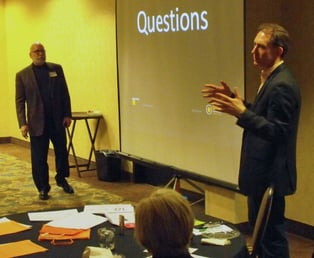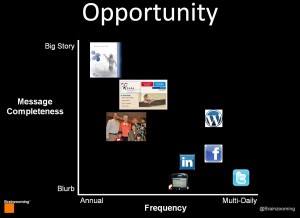 David Svet (of Spur Communications) and I presented at the Association of Fundraising Professionals AFP Forum recently on Dispelling Social Media Myths. We welcome you to look at a summarized version of the presentation at the end of this post or directly on Slideshare.
David Svet (of Spur Communications) and I presented at the Association of Fundraising Professionals AFP Forum recently on Dispelling Social Media Myths. We welcome you to look at a summarized version of the presentation at the end of this post or directly on Slideshare.
One question after the Dispelling Social Media Myths presentation related to what steps I would recommend to a fund raising professional on how to start social media activity when they have not done much yet. It’s a very relevant question based on the number of people at the AFP Forum who were still largely standing on the social media sidelines.
While the list below of near-term steps for how to start social media activity below is targeted to attendees at the Association of Fundraising Professionals session and their peers, the answer applies, with very few modifications, to any business development professionals still trying to determine how to start social media activity right now.
6 Steps – How to Start Social Media Activity for Business Development Professionals
1. Sign up for a few popular social networks.
This list of social networks covers the variety of opportunities a business development professional might need to address when starting: Twitter, LinkedIn, Facebook, Instagram . . . and maybe Google+ (if you want extra credit).
2. Begin to build an audience on these social networks.
Begin building a social network audience by following these groups on the social networks you've joined. While you want to follow current donors, you don't want to stop there:
- Your current donors
- Well-known donors in the community you know, even if they have not been directly involved with your organization (On Twitter, you can also follow targeted donors you DON’T know since the connections on Twitter are often more transient.)
- Friends (especially those who have links with your target audience)
- Prominent organizations you currently have relationships with or would like to develop them
- People already in your professional network (Again, on Twitter, you can reach beyond people in your current professional network more readily)
- Other prominent civic and charitable organizations
3. Create a list of (both personal and business) topics current and prospective donors will find interesting.
Social media content needs to start with the audience's needs in mind and work backwards to what you can share that's of interest for them. Create a short list of topics you will focus on for your social media sharing.
4. Begin sharing content related to the topics you identified in the previous step.
Begin sharing content on a regular and consistent basis, using this list of potential topic areas as a starting point for planning what content you'll feature.
- Resharing intriguing content from your organization as it is shared
- Update and share older content from your organization that's still relevant
- Sharing photos, reactions, news, and other tidbits about your organization pulled from traditional communications publications and events
- Share your own photos, reactions, and insider perspectives on your organization's cause (making sure to do it within your organization's social media policy)
- Sharing content related to your audiences’ topics that you come across in your work and reading.
5. Affirm (i.e., like, retweet, share, etc.) content from others.
By responding to the social media content your target donors and other audience members are sharing, you let them know you are present, paying attention, and appreciating their efforts.
6. Launch the steps to expand your professional relationships.
Look through the friends and acquaintances of your current donors to see who might be new prospective donors for you and begin to reach out to start forming new relationships.
This Is Simply a Starting Point for How to Start Social Media Activity
Admittedly, this list is simply a starting point, but these six steps are fundamentals for getting started in social media if you’re doing business development – whether in a nonprofit or a for-profit organization. - Mike Brown
If you enjoyed this article, subscribe to the free Brainzooming email updates.
 If you’re struggling with determining ROI and evaluating its impacts, download “6 Social Media Metrics You Must Track” today! This article provides a concise, strategic view of the numbers and stories that matter in shaping, implementing, and evaluating your strategy. You’ll learn lessons about when to address measurement strategy, identifying overlooked ROI opportunities, and creating a 6-metric dashboard. Download Your Free Copy of “6 Social Media Metrics You Must Track!”
If you’re struggling with determining ROI and evaluating its impacts, download “6 Social Media Metrics You Must Track” today! This article provides a concise, strategic view of the numbers and stories that matter in shaping, implementing, and evaluating your strategy. You’ll learn lessons about when to address measurement strategy, identifying overlooked ROI opportunities, and creating a 6-metric dashboard. Download Your Free Copy of “6 Social Media Metrics You Must Track!”



